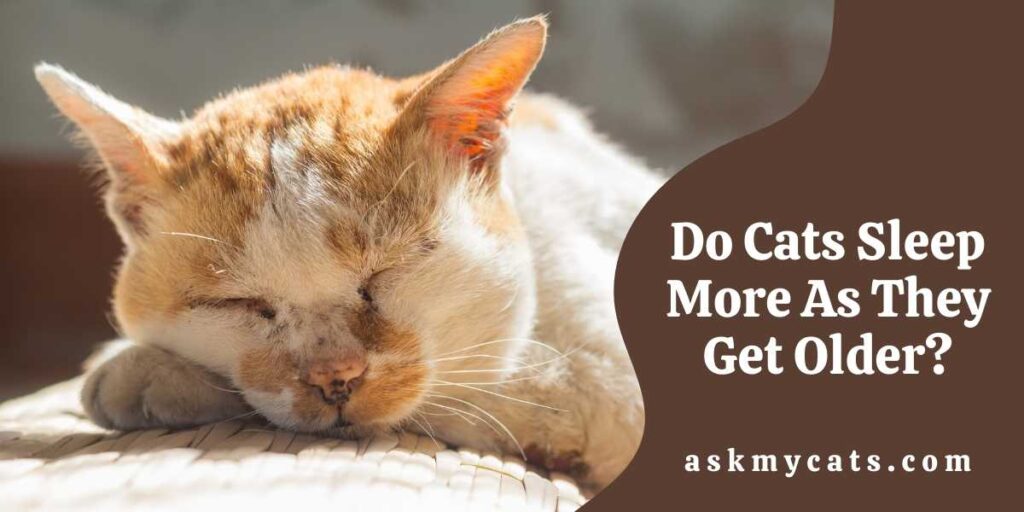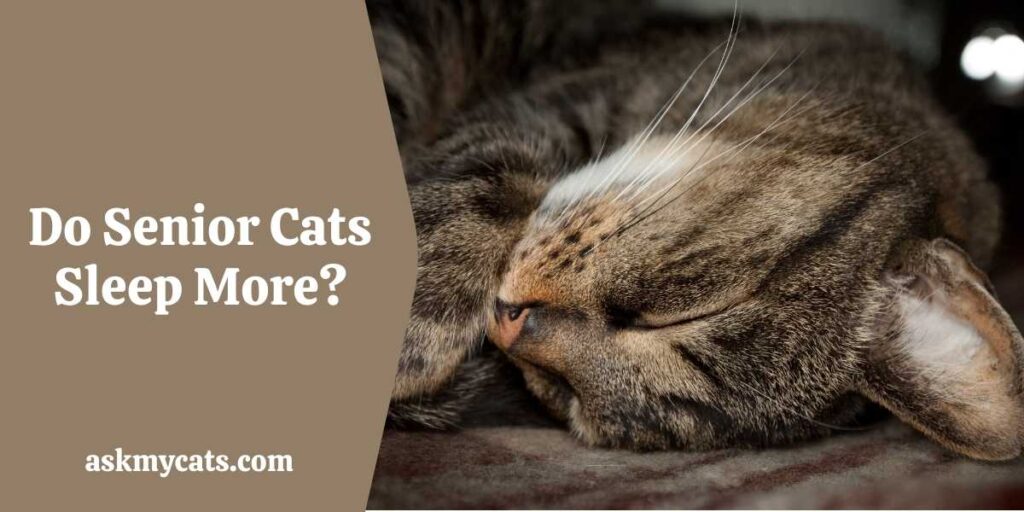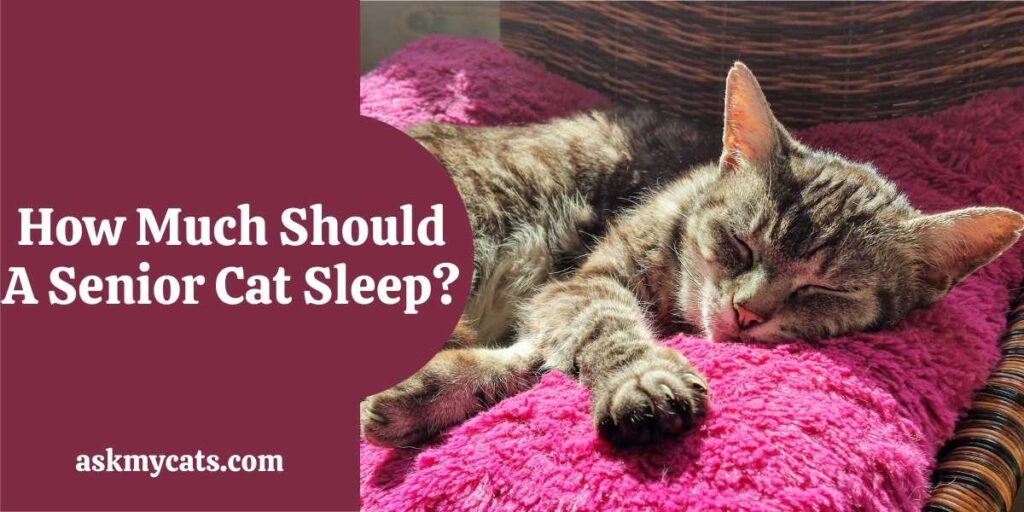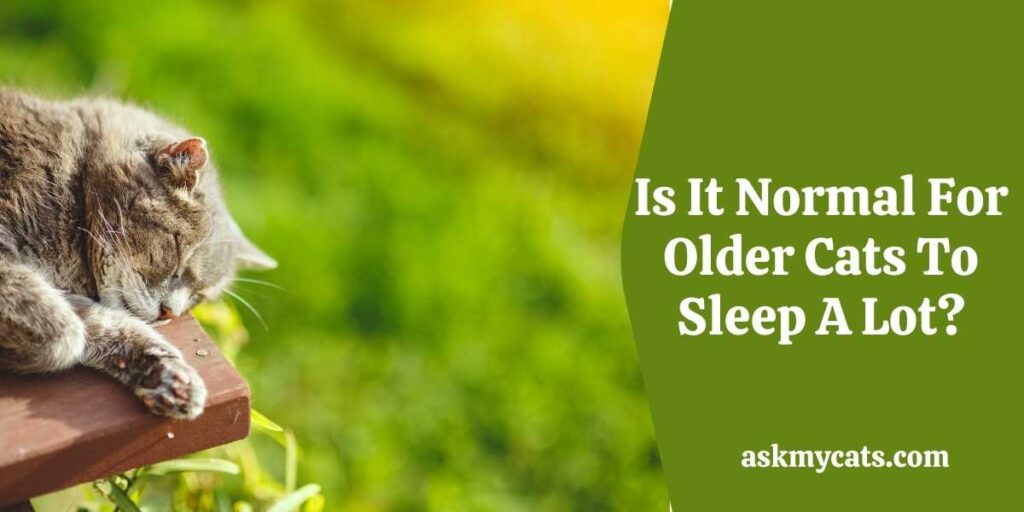If you see your senior cat sleeping for most of the day, you might be wondering how much sleep is typical for a senior cat and when it becomes problematic. An older cat’s sleep patterns may shift, which will usually mean sleeping more.
When a cat gets older, it will spend a lot more time sleeping. A cat that is 11 years old or older may sleep for up to 20 hours every day. This is a very typical method for senior cats to rest.
However, there are a few medical concerns to be aware of. You’ll also want to assist your elderly cat in getting the best rest possible.


Give Your Cat the Perfect Day
Get the Free Ebook!
Do Senior Cats Sleep More?
Yes, senior cats will start sleeping more.

When your adult cat reaches the age of 11, she is termed a senior. While not all cats exhibit evident cognitive and physical deficits at this age, normal ageing changes in cats occur gradually and invisibly.
You could detect a mild greying of her hair or a thinning of her coat at first. Her hearing may be impaired, and her appetite may be diminished.
She could take longer to get up after a rest, and she might not be able to jump to the same heights she used to. When she plays, she may become tired more quickly and appear to be less engaged in physical exercise in general.
It’s also totally typical for an adult cat to sleep for longer periods — up to 16-20 hours, just as she did as a kitten.
While most senior cats sleep more than they did when they were younger, it might be a sign of a medical concern if your senior cat is sleeping less.
As suggested by veterinarians, the most prevalent medical concern they find in older cats that spend less time catnapping is hyperthyroidism, which is the overproduction of thyroid hormone by the thyroid gland.
This causes a cat’s metabolism to rise to the point that she burns off too much bodyweight despite a hunger, among other symptoms. It also gives her unprecedented energy levels, preventing her from getting the rest her ageing body needs.
If her hyperthyroidism is not addressed, she will have heart and liver issues, deteriorating her health.
Oversleeping in a senior cat may have medical reasons. When a cat is sick or in pain, she may withdraw to hide her “vulnerability” and spend more time napping. Arthritis is a typical source of pain in cats as they become older.
If your cat requires help climbing into the cat bed or the litter box, is hesitant to walk up and down the stairs, and appears to spend more time collecting ZZZs, she might have arthritis.
Your veterinarian will be able to identify this illness and other medical causes of excessive napping and prescribe treatment to help her feel better.
How Much Should A Senior Cat Sleep?
Adult cats may sleep up to 16 hours per day, and this amount frequently rises as they become older.

According to a survey, the majority of cats aged 11 and up slept between 12 and 18 hours each day; however, a substantial percentage slept longer.
In addition to sleeping more, older cats are less interested in energetic pastimes like hunting and playing outside, preferring instead to spend peaceful time with their owners.
Cats sleep 79 out of every 104 minutes on average during 24 hours. Unlike humans, who sleep for lengthy periods at night, cats have a polyphasic sleep cycle, including many shorter periods of sleep throughout the day and night.
Cats are more active at night and sleep more throughout the day. Male and female cats appear to require the same amount of sleep.
Is It Normal For Older Cats To Sleep A Lot?
It is perfectly normal for older cats to sleep a lot.

A cat’s physique takes a great toll after a lifetime of hunting, leaping, and chasing. Sleep allows an elderly cat to rest and mend its weak bones, joints, and muscles. Rest is crucial for an elderly cat that is arthritic since movement is uncomfortable.
Utilising many muscles in tandem is required for feline mobility, and a senior cat’s body does not recuperate as quickly as previously. Focus on making your cat’s bed pleasant and accessible if your cat is healthy and functioning normally.
Consider the different possibilities for your senior cat’s lethargy, even if you don’t observe anything alarming. It might be natural, or your cat could be experiencing issues with its quality of life that need to be addressed.
A cat’s daily routine is exhausting. Walking necessitates the utilisation of all of a cat’s leg muscles. Even the most energetic cats like to move only when necessary, requiring regular naps.
On the other hand, a cat is always aware of its surroundings. Cats have great hearing and smell and constantly pick up on exterior cues. A cat’s whiskers also detect vibrations and variations in air pressure.
Cats go into deep slumber when they are not in REM sleep. This is a profound slumber with no dreams. It’s especially important for senior cats since this is when their bodies rebuild themselves. A cat’s deep slumber provides much-needed relief to sore joints.
Sleep aids in the relief of arthritis pain. Your cat will feel more capable of activity when it wakes up if it receives adequate rest. The bulk of a senior cat’s day is spent in deep slumber, not REM sleep.
It’s usual for cats to sleep for a long time after feeding to help with digestion. Traditional cat food is difficult for older cats to digest, which might make your senior cat feel lethargic and sleepy after eating.
You may purchase a variety of senior cat meals at your local pet store. Most respectable manufacturers provide these foods in tastes that your cats will appreciate. Explore these choices for feeding an age-appropriate diet to older cats.
According to Topics in Companion Animal Medicine, senior cats have difficulty digesting fats and carbs.
The focus of food for senior cats is on easily digested proteins. As a result, it does not occupy as much space in a cat’s stomach.
You may notice that your cat is livelier after switching foods. Even if this isn’t the case, it will still be much healthier. This food will be easier for the cat’s digestive tract to process.
Because cats avoid showing their suffering or illness, a sick cat prefers to hide and sleep. If this is the case, your cat is unlikely to be in pain or unwell.
These are the stances of contented cats. The traditional warning sign of discomfort is if your cat curls up into a ball (the foetal posture). The cat may be attempting to soothe itself.
Why Is My Older Cat Sleeping So Much?
If your elderly cat has hearing problems, it will go further into unexpected slumber since there is no noise to keep it awake and attentive.
Make noises out of your cat’s line of vision to test its hearing. Avoid creating noises with your hands or feet, such as clapping or stomping. These will produce vibrations that the cat’s whiskers will perceive, but you will not be any closer to determining whether or not your cat is deaf.
It’s always possible that a cat is dozing off due to boredom. If your cat is bored, it will sleep until something fascinating occurs. Cats slow down as they become older, but they still require some fun and amusement to keep them entertained.
For cats, boredom is a dangerous route to take. Boredom makes cats nervous and unhappy, which causes them to lose their appetite. Boredom can sometimes lead to attention-seeking and harmful behaviour.
Provide suitable amusement for your cat’s territory, such as toys, scratching posts, and climbing trees. There’s a good chance your cat will overlook these objects. Regardless, it will enjoy their presence and may employ them on occasion.
It would be best to regularly converse with your cat since cats like to communicate with their owners. If your cat is arthritic, it may miss the time you used to spend together playing. The next best thing is to engage in a dialogue.
At What Age Do Cats Start Sleeping More?
According to Oakland Veterinary Referral Services, cats start sleeping more after 11 years of age.
Routine is important to all cats, but older cats are especially fond of it. Keep in mind that your cat will spend less time awake. Your cat needs to be aware of important events in their life.
Set a good feeding time for each day and stick to it. Your cat will rapidly develop a body clock based on this and wake up early in the evening, awaiting a meal.
If at all feasible, include some activity into your cat’s daily routine. This might be via play or through simple physical movement. Senior cats usually require coercion to move, but it will benefit your cat’s sleep in the long run.
Allow your cat to groom itself after it has exercised and fed. Exercise, nutrition, and grooming are important factors in getting a good night’s sleep. Encourage your cat to stick to a pattern, and they will be able to enjoy some restful sleep.
A senior cat needs proper sleeping territory. This location must stay peaceful so that the cat is not disturbed. Environmental conditions, such as temperature, must also be taken into account.
Because cats are strong-willed and essentially do as they want, they frequently choose their domain. You can try to coax your cat into certain areas of the house, but older cats will gravitate toward peaceful areas with soft furniture and easy-access litter boxes on their own.
Frequently Asked Questions
Why has my cat started sleeping a lot?
Cats are known for sleeping for up to 16 hours every day. But, it is usual for this sleep to be part of the rest, hunt, eat, groom, and sleep cycle. If your cat sleeps more than usual throughout the day, they may want extra play/hunting stimulus.
Do 10-year-old cats sleep a lot?
Sleeping time for an adult cat can range from 16 to 18 hours per day. This is typical; however, a significant portion of the sleep is “catnapping.” A cat should react promptly to common cues such as the owner entering the room or preparing cat food.
Why is my old cat so clingy?
As your cat gets older, he may become more attached, wanting to be with you at all times of the day and night. This is a terrific method to offer your cat the attention he craves while still keeping his old body active. Some senior cats grow distant and less friendly, while others become more dependent.
Final Words
Senior cats have lower activity levels, go to bed sooner, and slumber more frequently and for longer than adult cats. Most cats sleep for longer hours each day as they get older than they did when they were younger.
Ask your questions in the comments section below.
